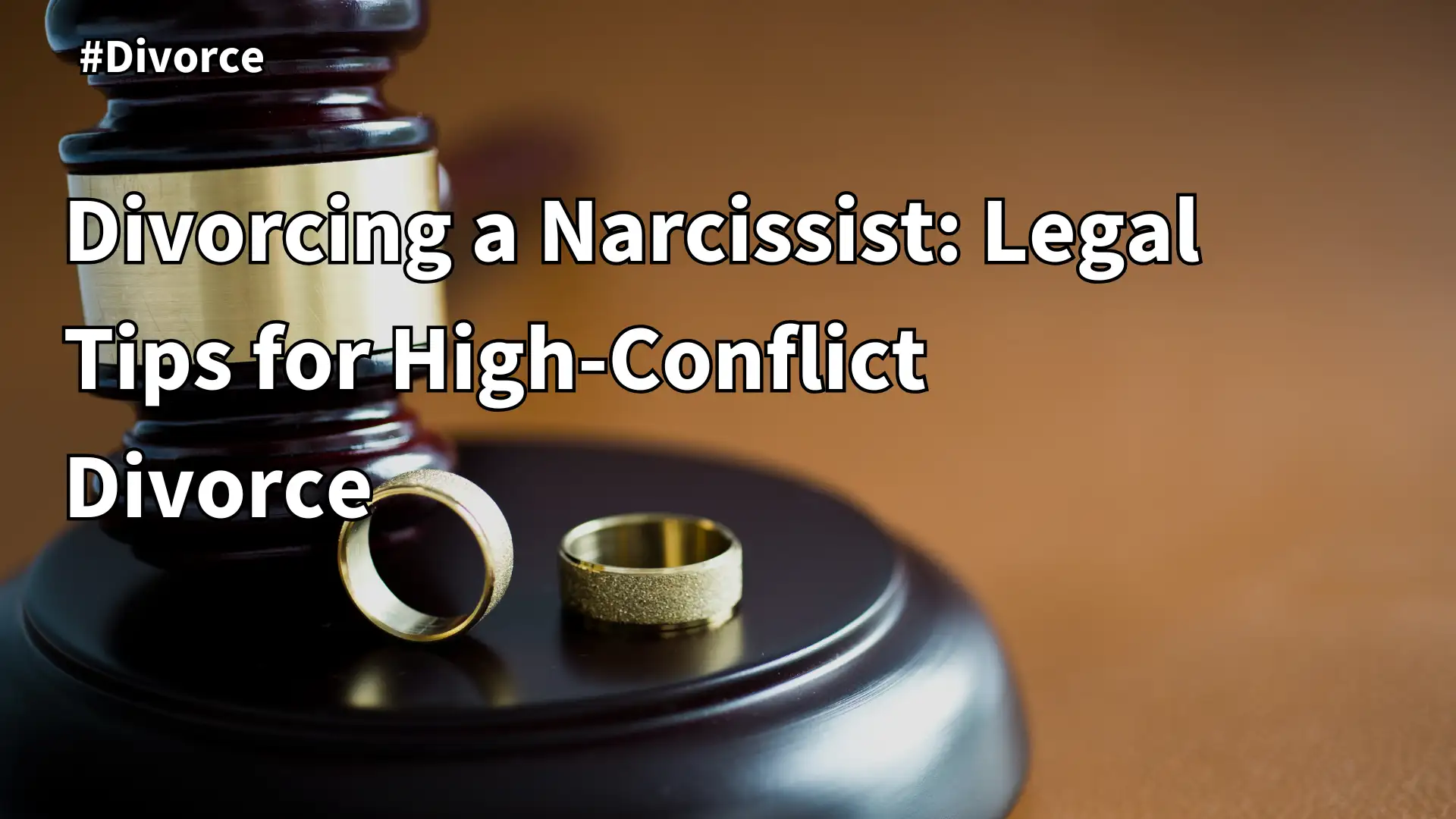
It’s not just about who gets what when you divorce a narcissist – it’s about getting out of a relationship full of control, manipulation, and emotional stress. These cases usually drag on, cost more, and wear you down.
If you’re going through this in Austin, Texas, you may face gaslighting, threats, custody battles, or court order violations. Knowing what to expect can make a big difference. Here are some common tactics narcissists use, and what steps you can take to protect yourself.
Legal Challenges When Divorcing a Narcissist
Narcissists may exploit the legal process to maintain control. Responding strategically helps you avoid delays, reduce stress, and stay focused on what matters. Here are some common tactics they might use:
- Financial Control and Hidden Assets – If your spouse has controlled the finances, they may exploit that power by hiding money, racking up debt, or transferring assets. Protect yourself by gathering financial records – bank statements, tax returns, retirement accounts, and credit card bills – so your attorney can uncover hidden assets using legal discovery tools and help restore financial clarity during the divorce.
- Court Order Violations – Narcissists often disregard court orders, skipping child exchanges, blocking communication, or withholding vital information from the other parent because they believe they are above the rules. To protect yourself, keep detailed notes and save all emails, text messages, and voice recordings; this documentation can support your attorney in requesting enforcement or modification hearings if necessary.
- Delays and Legal Games – Expect frequent filings, frivolous complaints, or surprise motions – tactics meant to wear you down and keep you off balance. The best defense is preparation, supported by legal representation that will not be swayed by intimidation or delay tactics. An experienced attorney can stay one step ahead and focus on real solutions instead of emotional reactions.
- False Accusations – Narcissists might lie and say you were abusive or did something wrong to make you look bad in court. Even if what they say is hurtful, try to stay calm and stick to the facts. Your lawyer can help by presenting evidence and calling witnesses to establish the truth. Staying calm helps protect your case.
When divorcing a narcissist, preparation is key. Stay focused on facts, document everything, and work with an attorney who understands high-conflict cases to protect your rights and keep the process on track.
Recognizing Narcissistic Behavior in Divorce
Narcissism can look different from person to person. Some people have a mental health condition called narcissistic personality disorder, while others may just act selfish, controlling, or manipulative. During a divorce, these behaviors often become worse, especially if the person feels like they’re losing control. Understanding this can help you recognize the signs and know what to expect.
- One of the most common behaviors you may encounter is emotional manipulation. A narcissist may cry to gain sympathy, blame you for everything that has gone wrong, or guilt-trip you into giving in. These tactics are designed to keep you emotionally vulnerable and unsure of your own decisions, making it harder to set boundaries or advocate for yourself.
- Gaslighting is another hallmark tactic. They may deny saying things you clearly remember, twist your words in conversations, or make you feel like you are overreacting. This emotional confusion is intended to keep you off balance and doubting your reality – a perilous position to be in during a legal battle.
- Many narcissists also refuse to cooperate with basic divorce procedures. They might delay signing papers, ignore court deadlines, or withhold financial documents. These tactics are not accidental – they are deliberate attempts to escalate stress, drain your resources, and stall the process until you give up.
- To outsiders, the narcissist may appear calm, charismatic, and reasonable. In reality, they can be cruel and controlling behind closed doors, violating court orders or threatening you in private while putting on a composed front in public. This contrast can be difficult to prove – unless you have documented everything.
Noticing these patterns early helps you get ready, both emotionally and legally. With a good lawyer and solid documentation, you can protect yourself and stay focused on what really matters: your peace and your future.
Child Custody Concerns and Parental Alienation
When kids are in the mix, divorcing a narcissist gets even harder. Instead of thinking about what’s best for the child, the narcissistic parent might use them to stay in control or mess with you. If this kind of behavior continues, it can cause emotional harm that sticks with the child.
Parental alienation happens when one parent tries to turn a child against the other parent. This can include saying the other parent left them, telling lies about their behavior, asking the child to keep secrets, or making the other parent seem unimportant. Over time, this can hurt the child’s emotions and damage their relationship with the alienated parent. If you think this is happening, write down what you notice. Your lawyer may ask the court to look into it.
High-conflict custody battles often follow. A narcissist may demand full custody not out of genuine concern, but to “win” or avoid paying child support. Even if they were previously uninvolved, they may suddenly claim to be the more capable parent. In Texas, courts prioritize the best interests of the child. Evidence of psychological abuse, interference, or court violations can help strengthen your case.
Do not try to keep the peace with someone actively undermining you. Legal action may be necessary to protect your child and your role in their life.
The Importance of Documentation and Evidence

- What to Document – Save all communication, including texts, emails, voicemails, and messages. Record missed visitations, custody exchange issues, emotional outbursts, threats, attempts to alienate your child, refusals to follow court orders, and unusual financial activity like sudden account changes.
- Tools to Use – Rely on co-parenting apps that timestamp conversations to ensure accountability. Avoid verbal-only discussions when possible. Take screenshots, save hard copies, and never delete messages – even ones that seem insignificant. These records can become vital evidence later on.
Keeping records over time can help show a clear pattern of someone’s behavior. If a narcissist is lying or twisting the truth, your notes and saved messages can prove what really happened. It also makes it easier to point out lies and protect your rights. When you keep good records, you stay ready, believable, and better able to handle what comes next.
Protect Your Mental Health
High-conflict divorce often leads to anxiety, depression, insomnia, and chronic stress. Many people feel like they have lost their identity or sense of peace. It is not just legal help you will need – it is emotional support, too.
Some approaches to support your well-being include:
- Therapy – Work with a therapist who understands narcissistic abuse and trauma.
- Boundaries – Keep communication brief. Say only what is necessary and avoid reacting to bait.
- Routine – Stick to regular meals, sleep, and daily habits to ground yourself.
- Support System – Surround yourself with people who see you clearly and encourage your healing.
- Affirmation – Remind yourself daily that you are not the problem. Their behavior is not your fault.
When your mental health is supported, your legal choices become clearer and more grounded. The stress will not vanish overnight, but caring for your emotional well-being gives you the strength to keep going. Protect your peace – so you can protect yourself and your children with clarity and confidence.
Why Legal Representation Matters in Narcissistic Divorces
Divorcing a narcissist is not a standard divorce. It requires foresight, strength, and legal strategy. Without skilled legal guidance, it is easy to become entangled in distractions, delays, or emotionally charged battles.
An attorney can help by:
- Creating strong court filings that highlight evidence of manipulation or abuse
- Requesting temporary court orders for custody, financial support, or protective boundaries
- Strategizing a communication plan that limits exposure and tracks interactions
- Preparing for trial by compiling evidence, timelines, and clear testimony
- Protecting your financial future by uncovering hidden assets or fighting unfair proposals
These divorces can be incredibly complex, especially when toxic dynamics and high-conflict behavior are involved, but you do not have to match your ex’s chaos with chaos. You need a strategy rooted in facts, law, and integrity. That’s why having someone by your side who remains calm, confident, and clear about your legal rights can make all the difference.
You Can Reclaim Your Life
Divorcing a narcissist may be one of the hardest things you will ever go through – but it can also be the most freeing. Every boundary you set and every legal step you take brings you closer to peace. You may feel exhausted or overwhelmed, but you are not broken. You’re showing up, you’re standing your ground, and you’re taking back control – mentally, emotionally, and legally.
If you’re in Austin and dealing with a high-conflict divorce, Smith & Bledsoe Family Law is here to guide you through it. Our team understands the challenges that come with toxic dynamics and will fight to protect your rights, your children, and your future. Contact us today to get started with a consultation.